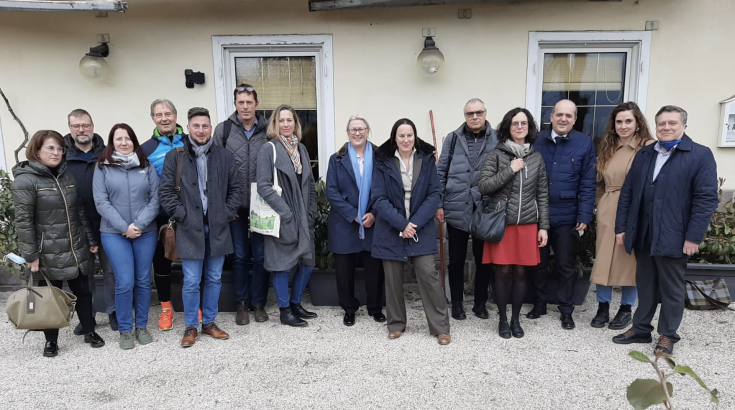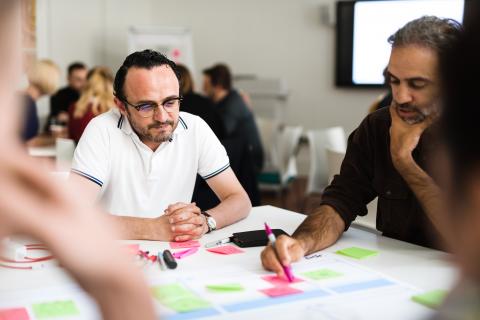Territorial strategies to turn the Val di Fiemme into a green community

On 30-31 March 2022, the Policy Learning Platform held a peer review in the Dolomites in Val di Fiemme, upon the request of for the Autonomous Province of Trento, which had asked for peer advice regarding its policy challenge on how to turn the Val di Fiemme into a truly green community.
Current state of affairs
The Province of Trento strives for a paradigm shift, where – through an integrated approach - natural resources, quality of life and the economic sectors are valorised and enriched in a green community aiming at developing a sustainable and resilient rural and mountain territory.
The future green communities shall make development plans combining energy, environment, economy and society aspects. The topic is complex as it covers all thematic aspects of low-carbon economy as well as all socio-economic dimensions in line with the philosophy of a community transition to a green development path.
The Province has proposed Val di Fiemme as a possible pilot area where the concept of “green community” can be made real. This territory has already a mature level of development in many key sectors, cornerstones for a highly sustainable environmental and economic policy: wood and all its supply chain; products of excellence in the food industry; tourism and leisure having a long high quality performance tradition, including sport where Val di Fiemme regularly hosts world-wide competitions (e.g. world ski championships).
To this end, the Province sought input from peers coming from other EU regions on their own experiences with the following:
- Green territorial transformation strategies with strong community involvement
- Community-led greening and circular economy measures (e.g. cooperatives for renewable energy production, bioenergy villages, green clusters, …)
- Sustainable tourism approaches (e.g. mobility concepts, green hotels, sharing economy)
Peers from across Europe
Alongside Katharina Krell and Astrid Severin, our low carbon economy and environment and resource efficiency Thematic Experts and Elena Ferrario, the thematic manager of the Policy Learning Platform, five excellent peers participated in the peer review:
- Daniela Schelch, Climate and Energy Model Region Karnische Energie, Hermagor, Austria
- Stefanie Lauber, Municipality of Zermatt, Switzerland
- Manfred Mair, Regional Management East Tyrol, Austria
- Marjut Villanen, LAB University of Applied Sciences, Lahti, Finland
- Karel Dervaux, Ecopower, Belgium
The peers provided the host Province and the local stakeholders with valuable insight, know-how and practical suggestions for solving the challenges presented above.
The host used the peer review to involve multiple local stakeholders from the public and private sectors from Val di Fiemme in a very lively discussion.
Recommendations
The peers found many very good initiatives at the outset in Val di Fiemme which could all be continued and upscaled to yield even stronger greening impacts. They made strategic recommendations for a number of key sectors of relevance for the valley: energy production and use, mobility, biodiversity/ecosystems, circular economy, food, and sustainable tourism.
In addition, it became clear that the valley would benefit from a more holistic strategic approach to its green transformation. The peers recommended elaborating a joint greening strategy, agreed with all stakeholders concerned, that would define the vision, set smart targets alongside with measurable impact indicators for monitoring of progress, concrete actions and resources.
It was strongly recommended to establish a permanent governance structure in charge of steering the entire process and of implementing the strategy, with a steering level and working groups for the actual implementation. Such a permanent structure would also be able to withstand political changes and election cycles more easily and overcome the problems that changing political will has caused in the past.
The peers who all volunteered their time to share their experiences with the local stakeholders all confirmed that they had thoroughly enjoyed the process and taken back valuable lessons for their own territories from the peer review – which confirms once again that the peer reviews are true win-win activities. As a result of the discussions, all peers made concrete offers for future exchange and collaboration.
The host’s policy challenges and all the peer suggestions will soon be found in the follow-up report.
Apply for a peer review!
Find solutions to your regional policy challenges with our experts and selected peers during a two-day peer review.

